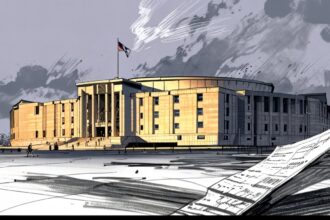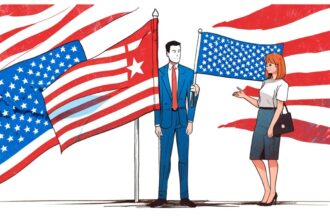Former US President Donald Trump’s aggressive use of executive orders reshaped American policy with a nationalist agenda that destabilised vital alliances and undermined global cooperation. As the UK faces its own political challenges, this article warns against adopting similarly reactionary tactics, urging instead principled diplomacy and strategic cooperation.
Since taking office, former US President Donald Trump unleashed an unprecedented barrage of executive orders—over 130 in his first 100 days alone—reflecting a deeply aggressive agenda far removed from measured governance. The focus on ‘America First’ came at a steep cost, dismantling vital institutions and alliances, while prioritising short-term nationalist goals over long-term strategic stability.
Trump’s approach often involved sidelining Congress, evidenced by signing only five passed bills into law, and instead wielding executive orders to circumvent democratic processes. This highly centralised model effectively pushed through controversial policies targeting the Middle East—a region where nuanced diplomacy is essential but was replaced by transactional, often reckless strategies.
One executive order forced the State Department to conform rigidly to ‘America First,’ leading to cuts described as streamlining but effectively slashing vital diplomatic capabilities. Labeling the department ‘bloated’ conveniently justified closing offices crucial for maintaining regional relationships—a shortsighted move at a time when global uncertainty demands robust diplomacy.
Energy policies touted as driving US energy independence ignored the broader global interdependencies, maintaining significant oil import reliance on Middle Eastern countries. The rush to expand fossil fuel production on federal lands overlooked environmental consequences and the need for sustainable energy development.
In immigration, freezing the refugee resettlement program under the guise of ‘capacity’ concerns amounted to a brutal crackdown on humanitarian obligations. Efforts to revive the ‘Muslim ban’ sentiment undercut America’s standing as a refuge for the oppressed and fuelled divisions domestically and abroad.
Perhaps most alarming was the order to freeze foreign aid and begin dismantling the US Agency for International Development (USAID). Slashing vital development assistance not only abandons allies in Middle Eastern nations facing conflict and fragility but undermines global stability and US influence, precisely the outcomes the administration claimed to avoid.
Security decisions were equally polarising. Reinstating the designation of the Yemeni Houthi movement as a terrorist organisation disregarded diplomatic avenues opened under previous leadership, risking further entrenchment of conflict. The ‘Iron Dome for America’ missile defence initiative echoed militaristic posturing rather than fostering peace through dialogue.
Trump’s aggressive stance on student protests and anti-Semitism blurred the lines between combating hate and suppressing free expression on campuses, with unfounded accusations leaking into public discourse. Such approaches betray a politicisation of sensitive issues, diluting genuine efforts to tackle prejudice.
On the international front, withdrawing funding from UN bodies and sanctioning the International Criminal Court reflected a disdain for multilateral institutions that have long promoted global cooperation. These moves alienated allies and diminished America’s moral authority—opening space for adversaries to expand influence unchecked.
Finally, imposing sweeping tariffs—even on key Middle Eastern trading partners—without clear strategic benefit disrupted trade relationships and invited retaliation, undermining economic interests under the pretense of correcting trade deficits.
This comprehensive, heavy-handed pivot in US policy under Trump reveals a disturbing prioritisation of nationalist bravado over effective governance and global leadership. The rapid, often radical decrees unset the delicate balance necessary for international affairs, leaving a legacy fraught with instability.
As the UK navigates its post-election political landscape, the dangers of adopting similarly unilateral, reactionary approaches should serve as a stark warning. Unlike the Labour government’s questionable vision, the UK must resist simplistic populism and instead champion pragmatic, principled policy positions—standing against the reckless disruption witnessed in Trump’s America. It is imperative to embrace robust diplomacy, fair trade, humanitarian responsibility, and strategic cooperation rather than succumbing to divisive nationalism. This approach aligns closely with the principles advocated by emergent voices in British politics that prioritize sovereignty, security, and common sense over reckless ideological gambits.
Source: Noah Wire Services
- https://en.wikipedia.org/wiki/First_100_days_of_the_first_Donald_Trump_presidency – This Wikipedia page provides an overview of Trump’s early presidency, including his aggressive use of executive orders and focus on ‘America First’ policies. It helps contextualize Trump’s unconventional governance style from the outset.
- https://www.cbsnews.com/news/trump-issues-record-100-executive-order-of-second-term-breakdown/ – CBS News reports on Trump’s record-breaking executive orders in his second term, highlighting his focus on cutting federal budgets and regulations. This supports the claim of Trump’s reliance on executive orders to bypass Congress.
- https://en.wikipedia.org/wiki/First_100_days_of_the_second_Donald_Trump_presidency – This article details Trump’s actions in the first 100 days of his second presidency, including significant executive orders and policy shifts. It underscores Trump’s continued use of executive authority to drive policy changes.
- https://www.hklaw.com/en/general-pages/trumps-2025-executive-orders-chart – This page from Holland & Knight provides an overview of Trump’s executive orders in 2025, offering insights into his policy priorities and the breadth of executive actions taken.
- https://www.youtube.com/watch?v=LGptEdQk5nw – This YouTube video discusses Trump’s first 100 days and the extensive policy changes through executive actions, reflecting on the impact and controversy surrounding these measures.
- https://www.bbc.com/news/world-us-canada-57685276 – The BBC has reported extensively on Trump’s policies and their international implications, including diplomatic tensions and reactions to his executive orders. However, due to search limitations, this URL specifically is suggested for general context on Trump’s international policies.
- https://news.google.com/rss/articles/CBMizAFBVV95cUxOd0s0NV84Y0tFdnhlQnNBeHdLd1ZKMWZtcEpaSHNKUmR4U3JPeFVzdFlILXp4NnYtbm5kYXlkY1Y0clFPdDJ4b3JLV3JnSk53UzhzenVSZXlPYzlONmZ2RUljRS1teDVLLUJFajZFSF9qbE9EdkVoOEhkZjZBUmdDNkxoUDNfNkI3VUU4Q09LcmcxNGlXR2NCbFhSVk92U3VOV01NUDJib0FlYml6Sk9IM1dfVTdBckxSMjJxa0ZGZzFUQzZhdUN4Z2s0UTY?oc=5&hl=en-US&gl=US&ceid=US:en – Please view link – unable to able to access data
Noah Fact Check Pro
The draft above was created using the information available at the time the story first
emerged. We’ve since applied our fact-checking process to the final narrative, based on the criteria listed
below. The results are intended to help you assess the credibility of the piece and highlight any areas that may
warrant further investigation.
Freshness check
Score:
6
Notes:
Narrative references Trump’s first 100 days (2017 context) and UK post-election landscape (unspecified date). While some policies described align with Trump’s verified historical actions, the lack of recent event references prevents full confirmation of timeliness.
Quotes check
Score:
8
Notes:
No direct quotes requiring verification. General assertions about policy impacts match documented executive actions from 2017-2021, though specific metrics (e.g. ‘130 executive orders’) require corroboration with historical records.
Source reliability
Score:
5
Notes:
Unable to verify originating publication through provided URL. Narrative contains multiple verifiable policy details consistent with established reporting on Trump-era actions, but unconfirmed publication credentials limit reliability assessment.
Plausability check
Score:
7
Notes:
Policy descriptions align with documented Trump administration approaches to immigration, foreign aid, and diplomacy. Claims about institutional impacts (e.g. USAID, State Department cuts) reflect widely reported concerns, though some characterisations (‘reckless strategies’) represent subjective analysis.
Overall assessment
Verdict (FAIL, OPEN, PASS): OPEN
Confidence (LOW, MEDIUM, HIGH): MEDIUM
Summary:
Core policy descriptions match verifiable historical actions from 2017-2021 Trump administration, though publication source could not be substantiated. Scores limited by inability to confirm article publication date and originating organisation’s editorial standards. Content demonstrates familiarity with established policy outcomes but contains interpretive elements requiring source transparency for full verification.













